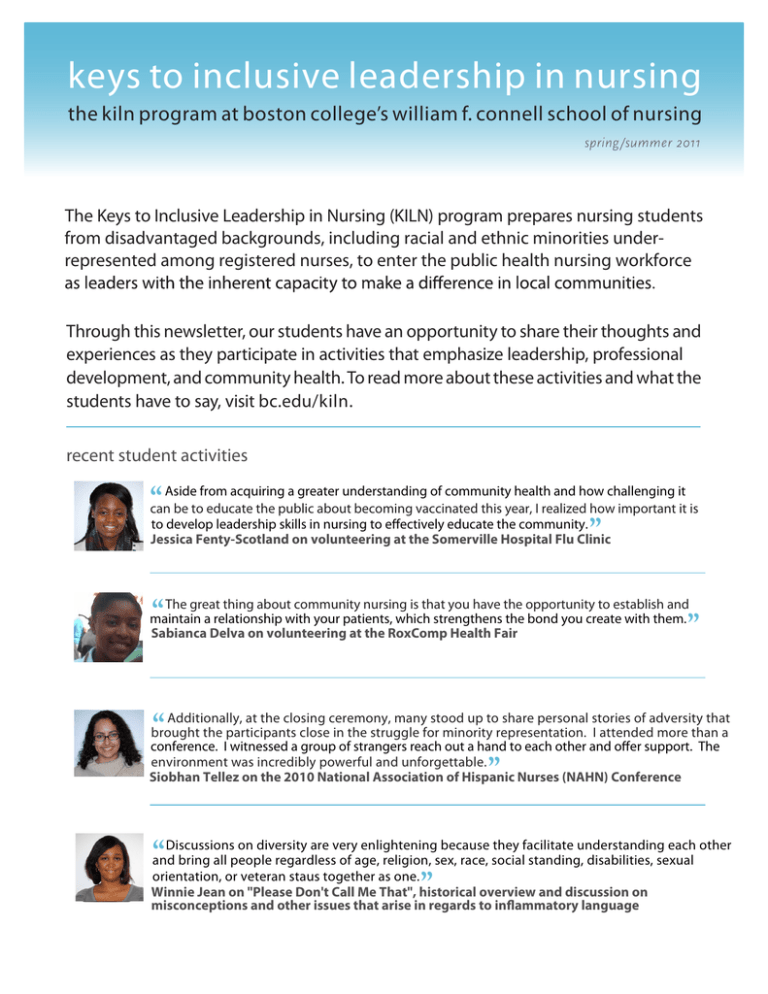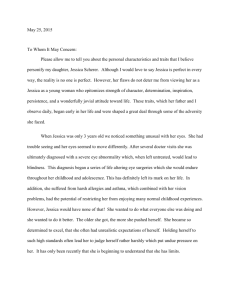keys to inclusive leadership in nursing
advertisement

keys to inclusive leadership in nursing the kiln program at boston college’s william f. connell school of nursing spring/summer 2011 The Keys to Inclusive Leadership in Nursing (KILN) program prepares nursing students from disadvantaged backgrounds, including racial and ethnic minorities underrepresented among registered nurses, to enter the public health nursing workforce Through this newsletter, our students have an opportunity to share their thoughts and experiences as they participate in activities that emphasize leadership, professional development, and community health. To read more about these activities and what the students have to say, visit bc.edu/kiln. recent student activities from acquiring a greater understanding of community health and how challenging it “canAside be to educate the public about becoming vaccinated this year, I realized how important it is to develop leadership skills in nursing to effectively educate the community. ” Jessica Fenty-Scotland on volunteering at the Somerville Hospital Flu Clinic “ The great thing about community nursing is that you have the opportunity to establish and maintain a relationship with your patients, which strengthens the bond you create with them. Sabianca Delva on volunteering at the RoxComp Health Fair “ ” Additionally, at the closing ceremony, many stood up to share personal stories of adversity that brought the participants close in the struggle for minority representation. I attended more than a conference. I witnessed a group of strangers reach out a hand to each other and offer support. The environment was incredibly powerful and unforgettable. Siobhan Tellez on the 2010 National Association of Hispanic Nurses (NAHN) Conference ” on diversity are very enlightening because they facilitate understanding each other “andDiscussions bring all people regardless of age, religion, sex, race, social standing, disabilities, sexual orientation, or veteran staus together as one. ” overview and discussion on Winnie Jean on "Please Don't Call Me That", historical misconceptions and other issues that arise in regards to inflammatory language why i chose nursing Jessica Fenty-Scotland Jessica, originally from Cambridge and later Medford, grew up in the shadows of some of the world’s greatest healthcare institutions. It seemed only natural that she had planned to become a doctor. However, as a “pre-med” student at Boston College, Jessica came to realize that it wasn’t for her. With the help of her advisors and mentors, she transferred to nursing. The content, the real-life application of new knowledge in clinical situations, and the relatively small size of the classes where she had the opportunity to work closely with faculty and peers proved to be the perfect choice for her. As the first KILN graduate in December of 2010, Jessica has passed her NCLEX exam and is now searching for the perfect first nursing position. From the faculty comments below, it is easy to see that Jessica has set the bar for those KILN Scholars who follow. Faculty Comments: “Jessica’s thoughtful approach to both patients and peers truly exemplifies what it means to be a Boston College Nurse. She is a respected leader and fellow students look to her as a mentor. She embraces this challenge and is consistently positive and attentive to other students. This has been greatly appreciated not only by her peers, but also by clinical instructors and faculty.” Amy Smith on Jessica’s Senior Synthesis Clinical Experience “I was impressed by Jessica’s ability to communicate with people of all ages- from elementary school age to elders in their nineties. She was able to tailor teaching about health promotion to the age of the people she was working with. She did well on home visits and was able to instruct homebound elders about managing their disease, taking medications, and being safe in their homes.” Mary McColgan on Jessica’s Community Nursing Clinical “Jessica has truly been a wonderful research assistant and addition to my research team over the past year. Her dedication to the research team members and endeavors is beyond compare and will no doubt translate directly to her patient care in the near future.” Angela Amar on Jessica as a Research Assistant “Jessica is unassuming and gentle but tenacious in her efforts to find the best way of supporting a client’s recovery. She is also able to support her fellow students in their process of getting acclimated to a specialty that is unlike any other clinical. I enjoyed working with Jessica and witnessing her growing sense of comfort and professionalism.” Pamela Terreri on Jessica’s Psychiatric Mental Health Clinical As a newly-minted ‘alum’ and rising star in the nursing profession, Jessica serves as a role model for KILN students who will follow. In a recent email Jessica offered this useful advice about studying for the NCLEX: “Make studying fun. I know it sounds kind of crazy to try to make studying fun, but if you create a pre-test and post-test system where you can evaluate the areas in your nursing knowledge that may be weaker than others and literally chart your progress, you will gain so much more from your time studying. This is something that Jean O'Neil taught me during my time working with her and it is honestly the most valuable technique I have learned in studying for the exam.” We wish Jessica all the best and look forward to following her progress in the years to come! Want to know more about the KILN program? Visit bc.edu/kiln, where you can read more about the scholars, meet the KILN team, and link to our blog. This project is supported by funds from the Division of Nursing (DN), Bureau of Health Professions (BHPr), Health Resources and Services Administration (HRSA), Department of Health and Human Services (DHHS) under grant number 1D19HP14617, Nursing




